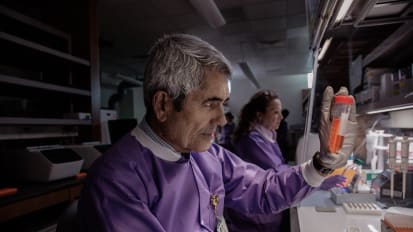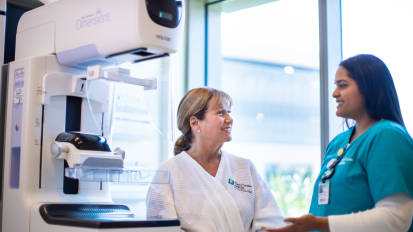Search Videos and More
 Video
Video
Lumps and Bumps – What to Do?
Dr. Giovanni Paraliticci, orthopedic surgical oncologist at Baptist Health’s Miami Orthopedics & Sports Medicine Institute shares the latest advancements in orthopedic oncology. News
News
Innovative Program at Miami Cancer Institute Gives New Meaning to ‘The Healing Arts’
The practice of medicine is often referred to as “the healing arts.” At Miami Cancer Institute, however, it’s not just the physicians doing the healing but also a group of seven professional artists. News
News
Cancer Patients with HIV Have More Options
Cancer patients with HIV often requires complex care. Miami Cancer Institute, now a member of the AIDS Malignancy Consortium (AMC), recently opened an HIV/Cancer Clinic, providing better access to new clinical trials as well as coordinated, multidisciplinary care in one location. News
News
Chemoprevention: Helping Patients Understand the Benefits
With chemoprevention medications proven to decrease breast cancer risk by 50 to 60 percent, Miami Cancer Institute experts are urging those with certain risk factors to take part in the Making Informed Choices on Incorporating Chemoprevention into Care (MiCHOICE) trial. News
News
Miami Cancer Institute Expert Co-Leads Research Effort Using Advanced Multi-omics Platform that Predicts Superior Overall Survival and Disease-Free Survival for Brain Cancer Patients
Manmeet Ahluwalia, M.D., M.B.A., deputy director, chief scientific officer and chief of solid tumor medical oncology at Miami Cancer Institute, and co-principal investigators of the trial, was featured in the 2021 ASCO Annual Meeting during the Central Nervous System Tumors Track News
News
Experts Weigh in on Innovations in Treatment of Lung Cancer
Baptist Health South Florida’s Miami Cancer Institute lung cancer experts Rupesh Kotecha, M.D., chief of Radiosurgery and director of the CNS Metastasis Program, and Mark Dylewski, M.D., chief of general thoracic surgery, are featured presenters at the American Lung Association’s upcoming LUNG FORCE expo. We asked them for a sneak peek at their topics. Video
Video
Dr. Guenther Koehne Talks Hot Topics in Hematology at the Miami Cancer Institute Summit
Dr. Guenther Koehne, Deputy Director and Chief of Blood & Marrow Transplant and Hematologic Oncology at Miami Cancer Institute, part of Baptist Health South Florida, spoke about the Second Summit of the Americas on Immunotherapy for Hematologic Malignancies and some of the hot topics being covered at this event. Video
Video
Q&A with Surgeons of Excellence at South Miami Hospital
What does it mean to be SRC accredited? Why do surgeons use robots in surgery? Surgeons of Excellence with South Miami Hospital sit down to discuss the significance of an SRC accreditation and the benefits of robotic surgery for patients. News
News
Father of Five and Military Veteran Wins Battle Over Throat Cancer
Fred Escobedo remembers feeling surprised when he was told he had throat cancer. After all, he seemed healthy, exercised regularly, didn’t smoke and followed his wife’s vegan diet. When the shock passed, he wondered if he’d live to see his five sons, ages 8 to 17, grow up. News
News
Making Clinical Trials More Accessible to All a Top Priority at Miami Cancer Institute
For cancer patients who have complex cancers with limited options or who have exhausted all other treatment options, clinical trials can be a beacon of hope. Such studies offer often-desperate patients access to new, potentially lifesaving therapies that are years away from being available to anyone else. News
News
Miami Cancer Institute’s 2nd Summit of the Americas on Immunotherapies for Hematologic Malignancies
LIVE VIRTUAL SYMPOSIUM Friday May 14th 2021 9:00 AM – 12:30 PM News
News
Milestone: Teen is 1,000th Patient Treated with Proton Therapy at Baptist Health’s Miami Cancer Institute
When Emma-Jane Hinton was diagnosed with a brain tumor this past summer, she dreamed about the day she could go back to school, take a swim and return to her Junior Bengals cheerleading team. Last week, the teen’s dream came true as she rang the bell at Baptist Health’s Miami Cancer Institute, signifying the end of her treatment, the return to life--and a cure.
